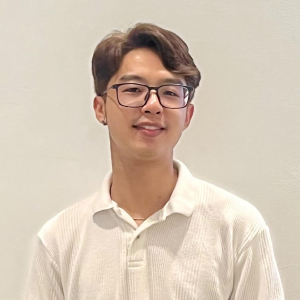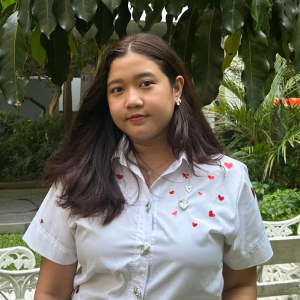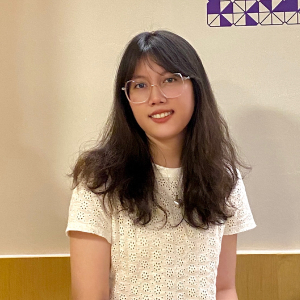Telecommunications (TC)
PhD Degree

Free consultation for this program
We are ready to help you with your difficulties and processing.
Duration
3.5 years
Study Format
On Campus
No. of Student Mentors
72
Total Tuition Fees
1,495,800 THB





Free consultation for this program
We are ready to help you with your difficulties and processing.
Duration
3.5 years
Study Format
On Campus
No. of Student Mentors
72
Total Tuition Fees
1,495,800 THB





Program
Key information
University
Program structure
Tuition fees
Admissions
Possible Career Pathway
Student's testimonials
F&Qs
ABOUT THIS PROGRAM
The Telecommunications program offers areas of specialization in transmission systems; switching systems; telematics; network planning, and in collaboration with the School of Management, telecommunications management.
The courses offered to emphasize modern telecommunications skills in systems planning and engineering, telecommunications software development, and administrative and financial aspects of telecommunications management.
Graduates from the master’s program form the nucleus for effective high-level technical planning and management operations at their employer organizations. Some of the graduates are engaged in planning, development, and service activities leading to the installation, commissioning, management, design, etc. of value-added systems. Given the important role of our graduates in the development of the telecommunications sector, the learning is of significant benefit to the users of telecommunications services within the region.
Graduates of the doctoral program play key roles in enhancing the level of education and research in the national universities of the region and promoting and strengthening the R&D potential of emerging regional manufacturing industries.
The research covers a wide variety of topics at the cutting edge of research and development. Specific issues addressed in the broad fields of transmission and switching systems are, for example, coherent optical communications, multiple-access strategies for cellular-mobile and cabled networks, as well as questions of congestion control and new services in ISDN and future B-ISDN networks.
Research Focus Area
- Transmission systems
- Telematics
- Network planning
- Coherent optical communications
- Multiple-access strategies
- Cellular-mobile and cabled networks
- Congestion control
KEY INFORMATION
Degree
PhD
Language
English
Location
Thailand
Intake Start Date
Jan 2026
Study Format
On Campus
Duration
3.5 years
Program Highlight
Standard Program
Total Semester
7
Total Tuition Fees
1,495,800 THB / in total
Application deadline
Jul 2026
ABOUT UNIVERSITY

Asian Institute of Technology, 58 Moo 9, Km. 42, Paholyothin Highway, Klong Luang, Pathumthani 12120, Thailand, Khlong Nueng, Pathum Thani 12120 Thailand
Asia Ranking 2026
EduRank Ranking 426
Programs
91
Students
Not Provided Yet
The Asian Institute of Technology (AIT) is an international English-speaking postgraduate institution, focusing on engineering, sustainability, and management studies. AIT’s rigorous academic, research, and experiential outreach programs prepare graduates for professional success and leadership roles in Asia and beyond.
Founded in 1959, AIT offers the opportunity to study at an institution in Asia which possesses a global reputation. Going forward, AIT will be stressing its global connections, injection of innovation into research and teaching, its relevance to industry, and its nurturing of entrepreneurship, while continuing to fulfill its social impact and capacity building role. Sitting on a beautiful green campus located just north of Bangkok, Thailand, AIT operates as a multicultural community where a cosmopolitan approach to living and learning is the rule. You will meet and study with people from all around the world.
Today, AIT’s internationally recognized engineering, environment, and management graduates are highly sought after by employers in their home countryand elsewhere. Across many walks of life in Asia, AIT alumni have distinguished themselves as CEO’s of private and state enterprises, as business owners, as well-respected researchers and faculty, and as senior university and government officials.
See more
PROGRAM STRUCTURE
Course Structure
Course ID Course Title Credit Semester Remark
AT77.01 Telecommunication Networks 3(3-0) August Required
AT77.02 Signals and Systems 3(2-3) August Required
AT77.03 Digital Transmission Technologies 3(2-3) August Elective
AT77.04 Data Communications 3(3-0) August Elective
AT77.05 Teletraffic Engineering 3(2.5-1.5) August Elective
AT77.06 Multimedia Communications and Systems 3(3-0) August Elective
AT77.07 Cellular Mobile Systems 3(3-0) August Elective
AT77.08 Network Planning 3(2.5-1.5) August Elective
AT77.09 Error Control Coding 3(3-0) August Elective
AT77.10 Cellular Network Planning 3(2-3) August Elective
AT77.11 Digital Modulation Techniques 3(2-3) January Elective
AT77.12 Switching Systems 3(2.5-1.5) January Elective
AT77.13 Digital Communications 3(3-0) January Elective
AT77.14 Fiber Optic Components and Systems 3(2-3) January Elective
AT77.15 Satellite Communications 3(3-0) January Elective
AT77.16 Digital Signal Processing 3(2-3) August Elective
AT77.17 Network QoS 3(3-0) January Elective
AT77.18 Optical Network 3(3-0) January Elective
AT77.19 Optimization for Communications and Networks 3(3-0) August Elective
AT77.61 Signal and Digital Transmission Technologies 3(3-0) August Elective
AT77.62 Optical Network 3(3-0) August Elective
AT77.63 Cellular Mobile Systems and Planning 3(3-0) January Elective
AT77.64 IP Network in Data and Multimedia Communication 3(3-0) January Elective
AT77.65 Selected Topic: Convergence Networks 1(2-0) August Elective
AT77.66 Technology Road-mapping Strategies for Telecommunications (Management Component II) 2(2-0) August Elective
AT77.67 Telecom Product and Service Design (Management Component I) 2(2-0) January Elective
AT77.68 Project and Financial Management (Management Component III) 3(3-0) InterSem Elective
AT77.9001 Selected Topic: The Methodology of Scientific Research 2(-) January Elective
AT77.9002 Selected Topic: Network QoS 3(3-0) InterSem Elective
AT77.9003 Selected Topic: Advanced Wireless Communication Systems 3(3-0) January Elective
AT77.9004 Selected Topic: Interactive Transmission over IP Networks 3(3-0) August Elective
AT77.9005 Selected Topic: Cryptography 2(-) August Elective
AT77.9006 Selected Topic: Optical Network 3(3-0) January Elective
AT77.9007 Selected Topic: Statistical Communication Theory 3(3-0) August Elective
AT77.9008 Selected Topic: Advanced Signal Processing for Wireless Communications 3(3-0) January Elective
AT77.9009 Selected Topic: Discrete-Time Statistical Signal Processing 3(3-0) January Elective
AT77.9010 Selected Topic: Multiuser Detection 3(3-0) InterSem Elective
AT77.9011 Selected Topic: Optimization for Communications and Networks 3(3-0) August Elective
AT77.9012 Selected Topic: UMTS/WCDMA Radio Access Network Planning 1(1-0) January Elective
AT77.9013 Selected Topic: Network Simulation and Modelling Using NS2 (Network Simulator 2) 1(1-0) InterSem Elective
AT77.9014 Selected Topic: Mathematics for Telecommunications 3(3-0) InterSem Elective
AT77.9015 Selected Topic: Probability Theory 1(1-0) August Elective
AT77.9016 Selected Topic: Cellular Network Planning 2(1.5-1.5) August Elective
AT77.9017 Selected Topic: Software Project on Network Optimization 2(1-3) InterSem Elective
AT77.9018 Selected Topic: Network Simulation and Optimization Using Python 1(0-3) January Elective
TUITION FEES
Tuition fees
1,495,800 THB / in total
Application fees
800 THB
Application fee cannot be refunded.
Get a Free Consultation!
Not sure where to start with your application?
Our student ambassadors can walk you through the admission process, step by step.
ADMISSIONS PROCESS

- Have strong academic records (both undergraduate and graduate) and normally hold a four-year bachelor’s degree and a Master’s degree*, preferably with a combination of course and thesis work, from an institution of good standing, acceptable to AIT. The minimum cGPA requirement for admission to the doctoral program is 3.50 or equivalent, at the Master’s degree level.
- English Proficiency Requirement: AIT-EET: 6; IELTS Academic: overall 6 (writing 6); TOEFL iBT: overall 80 (writing 21-23); & PTE Academic: overall 52 (writing 62-73)
- Submit a brief outline of dissertation research proposal (5-10 pages) including the required research facilities, if necessary.
- Two recommendation letters.
Preferred Background
A good master’s degree in Telecommunications or a closely related field is a prerequisite.
Possible Career Pathway
Graduates of the Telecommunications (TC) program are well-prepared to pursue careers in the rapidly evolving field of telecommunications and networking. With in-depth knowledge of telecommunication networks, digital transmission technologies, mobile and cellular systems, and network planning, they can work as network engineers, telecommunications analysts, or systems designers. The program also covers emerging areas like multimedia communications, optical networks, and satellite communications, allowing graduates to contribute to the design, implementation, and optimization of complex communication systems. Opportunities exist in telecommunications companies, internet service providers, government agencies, and technology firms that rely on advanced communication infrastructure. Their expertise in both theoretical and practical aspects of telecommunications positions them to lead in the deployment of next-generation networks, including 5G and beyond.
STUDENT's TESTIMONIALS
No testimonials available just yet — stay tuned!
FAQs
Question :
Can I apply to two Academic Programs at the same time?
Answer :
No. You can only apply to one academic program at any time.
Question :
Do you have academic exchange programs and scholarships for those?
Answer :
2 Year Master’s Degree students normally study for 22 months (enrolled in August Intake) and 24 months (enrolled in January Intake) which includes four semesters, two short breaks and one long break between semesters. Doctoral students study for at least 42 months or seven semesters. 1-year Master, Professional Master Program and the Diploma Programs are at least 12 months or two semesters and the Certificate Program is 5 months or one semester.
Question :
What are Unified programs?
Answer :
Unified Programs integrate undergraduate studies with graduate studies into a seamless “Unified” program. For example, undergraduate students may join AIT in their final year to complete their undergraduate degree and at the same time start their Master program at AIT. AIT has several Unified programs with partner universities managed by Office of Special Degree Program.
Question :
What is the AIT English Entry Test (AIT-EET)?
Answer :
The Language Center (LC) offers a 90-minute in-house test of English proficiency called the AIT English Entry Test (EET). The score is based on a nine-point scale similar to the IELTS test. The Writing score, which is the most important at AIT, is based on an essay. The test result will be e-mailed within 7 days. The LC will report the test result to the AIT Admissions only if the score is satisfactory for provisional admission. If applicants fail to obtain the minimum score requirements for admission, they may take the test again.
Question :
Will you waive my admission interviews since I was admitted last year but chose not to register?
Answer :
No. As the application assessment varies from each intake, your application in the next intake must be as competitive as those with others applying in that same intake.
Question :
Do I need to apply for the scholarships listed on the website?
Answer :
You do not need to apply separately for the scholarships. Once you have submitted the application online, your will be automatically considered for all scholarships for which the deadline has not expired and for which you are eligible. The type and amount of scholarship given to applicants is on a competitive basis with the main criteria of academic standing. Should you wish to be considered for full scholarships, you must submit an Official English score of 6 including writing and overall that is not older than 2 years.
Question :
How much is the application processing fee?
Answer :
The processing fee is Baht 800 or US$25.
Question :
If I apply and accepted this intake, can I defer to the next intake with the same condition?
Answer :
Yes, you can defer your entry until the next academic semester. However, the financial conditions of the admission may change depending on the competitive assessment for the next semester. You are also required to pay the application processing fee to reactivate your admission.
Question :
When is the school intake and the application deadline?
Answer :
The AIT academic year consists of two semesters: January and August for School of Engineering and Technology (SET) and School of Environment Resources and Development (SERD).